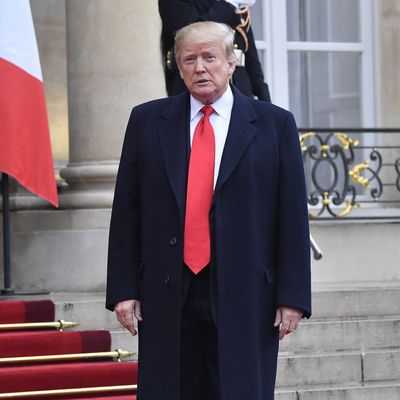
Sunday was the 100-year anniversary of the end of World War I, a conflict that claimed the lives of over 1 million French soldiers. Two days later, France observed the three-year anniversary of the 2015 Paris attacks, a terrorist rampage that killed more than 100 French civilians, many of them under 30 years old.
So, naturally, the president of the United States decided that now would be the perfect time to mock the French for having lost to the Nazis.
“Emmanuel Macron suggests building its own army to protect Europe against the U.S., China and Russia,” Donald Trump tweeted Tuesday morning. “But it was Germany in World Wars One & Two – how did that work out for France? They were starting to learn German in Paris before the U.S. came along. Pay for NATO or not!”
Here, Trump is responding to the French president’s recent call for Europe to develop its own, autonomous military capabilities. But in those remarks, Macron did not intend to propose a “European army” as a replacement for NATO — let alone, to suggest that the E.U. should regard the United States as a geopolitical threat. Rather, as the French leader made clear in an interview with CNN, Macron believes European nations should increase their defense spending, in order to more equitably share the burden of funding NATO, precisely as Trump has requested — he just doesn’t want to invest that new spending in American munitions.
“What I don’t want to see is European countries increasing the budget in defense in order to buy Americans’ and other arms or materials coming from your industry,” Macron told Fareed Zakaria over the weekend. “I think if we increase our budget, it’s to have to build our autonomy and to become an actual sovereign power.”
Trump was either unaware of these remarks, or else, defines “Pay for NATO” as “pay tribute to arms manufacturers” (the president has previously suggested that maximizing U.S. arms sales is one of his top foreign-policy goals).
Regardless, once Trump got started airing his grievances about the French, he couldn’t stop. After a trip to Paris marked by critical coverage of his decision to take a rain check on ceremonies at the Aisne-Marne American Cemetery — and a pointed rebuke from Macron, who said in a speech that nationalism was the opposite of patriotism — Trump let loose some politically incorrect truths about the quality of French wine (among other things):
On Trade, France makes excellent wine, but so does the U.S. The problem is that France makes it very hard for the U.S. to sell its wines into France, and charges big Tariffs, whereas the U.S. makes it easy for French wines, and charges very small Tariffs. Not fair, must change!
The problem is that Emmanuel suffers from a very low Approval Rating in France, 26%, and an unemployment rate of almost 10%. He was just trying to get onto another subject. By the way, there is no country more Nationalist than France, very proud people-and rightfully so!…………..MAKE FRANCE GREAT AGAIN!
By the way, when the helicopter couldn’t fly to the first cemetery in France because of almost zero visibility, I suggested driving. Secret Service said NO, too far from airport & big Paris shutdown. Speech next day at American Cemetary in pouring rain! Little reported-Fake News!
Were it not for France’s protectionism, Franzia and the Trump Winery would surely dominate the Parisian wine market. But while few would quibble with president’s claim that American wine is of equal (if not superior) quality to France’s, Trump’s tweet is still in tension with his administration’s own policies — right now, the White House is pushing to end a tax break that American wine exporters say is vital to their competitiveness overseas.
The president is correct that Macron is currently, markedly less popular with French voters than Trump is with American ones. And he’s probably right to insinuate that Macron’s recent jabs at Trump were motivated, at least in part, by a desire to capitalize on the French public’s contempt for the American leader. But Trump’s praise of French nationalism — and his call for making that nation “great again” — would seem to be in tension with his demand for France to sacrifice its national interests (on arms sales and wine tariffs) in the interest of fairness.
Finally, it is possible that the media’s coverage of Trump’s failure to attend ceremonies at the Aisne-Marne were unfair, and that security concerns, not personal laziness (or concerns over a bad-hair day) kept Trump from traveling through the rain to the event. If so, then the Fourth Estate’s suggestions to the contrary were truly egregious — after all, what cause has Donald Trump ever given the press for denying him the benefit of the doubt?






























